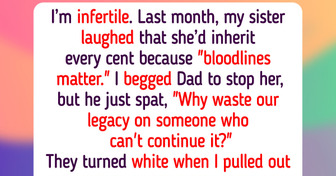Sue them, shame them further in public, mention each of their name and address, jail them. never give any mercy to anyone who cheat you
I Passed 4 Tests for a Job, Got Ghosted by HR — They Used My Project, I Got Revenge
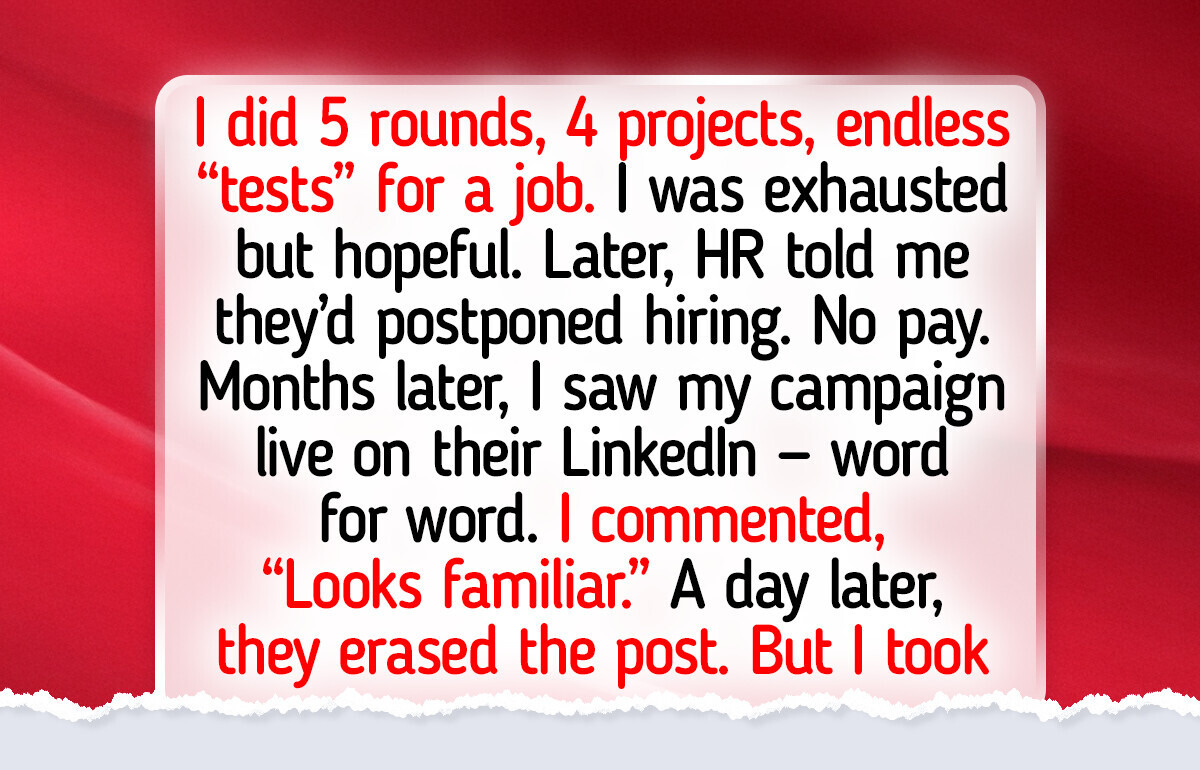
She didn’t land the job but her work sure did. Four tests, endless effort, and promises that never became real. When HR ghosted her, she thought it was over. It wasn’t. The real shock came months later.
The letter of our reader:
Hi Bright Side,
So, I applied for this job that looked perfect — good pay, solid team, growth potential.
The first interview went great. Smooth conversation, good vibes.
Then came the “tests.”
Not one. Not two.
Tests with four separate projects.
I’m talking full-scale work — strategy decks, competitor breakdowns, even a full campaign proposal. Real stuff they could actually use.
Each time, they said the same thing: “You’re our strongest candidate so far.” So I pushed through. I skipped weekends, stayed up late, and poured everything into those tasks. Five rounds later, I was exhausted but hopeful. Then HR called:
“It’s between you and another candidate. We’ll let you know next week.”
A week passed. Then two. Nothing. Finally, I get an email — not a rejection, not an offer. Just this:
“We’ve decided to postpone hiring for this position.”
Okay, fine. I moved on. Fast forward three months. I’m scrolling LinkedIn one night and see a post from that same company:
“Excited to announce our new campaign launch!”
The graphics, the copy, the entire concept... was mine.
Word for word. Slide for slide. They literally took my unpaid test work and ran it.
I commented one line under the post:
“Looks familiar 😉”
A day later, the post vanished. But I took before screenshots, turned it into a post titled:
“That time, a company used my unpaid interview project as their campaign.”
It blew up overnight. Thousands of likes, DMs, and one comment from another company:
“We’d love to hire someone with that kind of creativity — and integrity.”
Two weeks later, I signed a new contract — higher pay, just an interview and one “test.”
The best part?
The stolen campaign quietly disappeared.
But the story stayed up — right next to my new job announcement.
Sincerely,
E.

Case Studies in Job Interviews: How to Protect Your Work (and Your Sanity)
So, you finally landed an interview for your dream job — congrats! But before you get too excited, there’s another hurdle waiting: the case study.
If you’ve ever spent your weekend creating a full marketing plan, financial model, or product strategy for a company that never called back, you’re not alone. Many recruiters now ask candidates to complete “case studies” or “practical tasks” as part of the hiring process.
It’s meant to test your skills — but sometimes, it starts to feel a lot like unpaid work.
Let’s talk about what case studies really are, when they’re fair, and how you can protect your hard-earned ideas.

What Even Is a Case Study?
In short: it’s a mock business problem you’re asked to solve to show how you think.
You might be given a real scenario, a data set, or a company challenge and asked to present your plan.
They’re common in consulting, marketing, product, and management roles — and usually take 20–30 minutes in an interview. But sometimes, recruiters send you home with a “small project.” And that’s when things can get tricky.
A case study should let you demonstrate your creativity and logic. It’s not supposed to be free labor. Still, the line between a fair test and “doing actual work” can blur fast.
Are Case Studies Legal?
Technically, yes — most of the time.
According to employment barrister Suzanne Staunton of JMW Solicitors, case studies only cross the legal line when they become exploitative.
If the task is discriminatory, harassing, or the company intends to use your work commercially without hiring or paying you, that could amount to misrepresentation or even fraud.
The bad news? Proving it is expensive and hard. Even if you win, damages tend to be small. So prevention — not reaction — is key.
Should You Get Paid for a Case Study?
Usually, no. If it’s a genuine part of the recruitment process and they don’t use your work, companies don’t have to pay you.
But if the “assignment” looks suspiciously like real deliverables — say, a polished campaign or strategy document they could actually use — you’re right to feel uneasy.
You can (politely) ask about the scope before agreeing:
“Just to confirm, this is only for interview purposes, right?”
That simple question sets a boundary — and signals that you know your rights.
If They Ghost You After Using Your Work
Sadly, this happens. If you later see your ideas, visuals, or copy live on their website or social media, you do have legal rights.
Intellectual property lawyer Philip Partington explains that you, the creator, own the copyright. If they used your material without permission or payment, that’s an infringement.
You can file a claim — but again, it’s pricey and rarely worth the legal battle. Still, sending a formal notice or even a public post (carefully worded) can make companies think twice about doing it again.

Can You Ask Them to Delete It?
Yes. You can request that they permanently delete your case study from their systems. But doing so might also close the door on future opportunities with that company.
It’s a tough call — but your time, effort, and creativity are worth protecting.
How to Protect Your Work (Without Burning Bridges)
- Ask clear questions before agreeing.
Confirm how your work will be used and who will see it. - Limit the detail.
Give them enough to demonstrate your thought process — not a full polished deliverable they can run with. - Add a subtle watermark or note.
You can include a line like “Created solely for interview purposes.” - Document everything.
Keep emails and submission timestamps in case something looks suspicious later. - Know when to walk away.
If a “test” feels like an unpaid project, it probably is.
Remember: you’re not just proving you’re qualified — you’re learning if they are, too.
15+ People Who Turned Effort and Skill Into Beauty and Comfort
Comments
Related Reads
14 Employees Who Paid the Ultimate Price for Their Mistakes
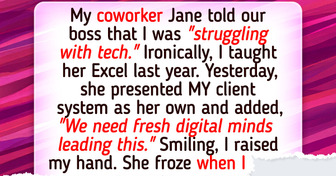
HR Fired Me Before My Vacation — They Forgot One Thing
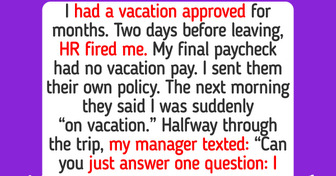
I Refuse to Accept Being Called Unresponsive for Sleeping
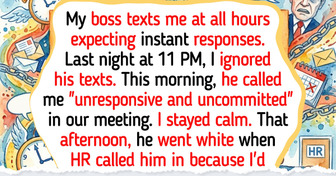
I Refused to Host Christmas for My Family — My Sister Took It Personally
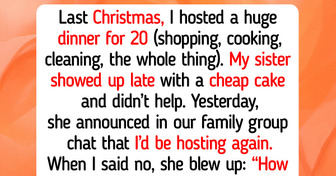
11 Stories of Stepparents Who Chose Kindness Through Tough Times
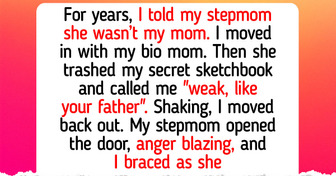
I Was Fired for Taking Days Off During a Family Emergency
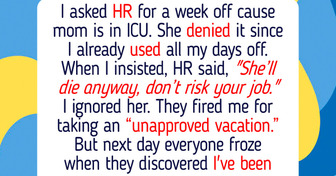
15+ Times an Unexpected Guest Turned an Ordinary Day Into a Scene Straight Out of a Movie
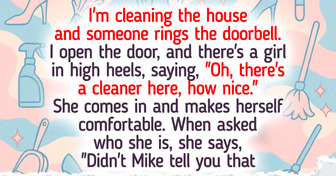
I Refuse to Return My Late Colleague’s Paycheck, Now His Widow Is Furious
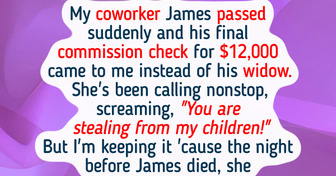
22 Moments That Prove Quiet Kindness Can Work Real Miracles
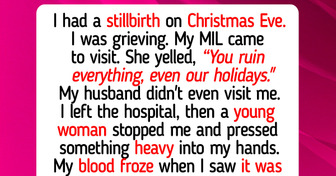
17 Stories That Prove Kindness Isn’t Naive, It’s Courage in Disguise
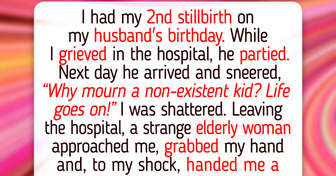
15 Pets Who Made a Mess and Feel Absolutely No Shame
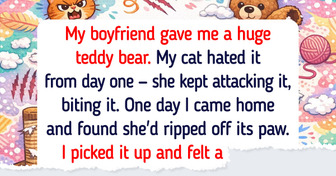
I Refuse to Forgive My Parents After They Took My Inheritance for Being Childless
